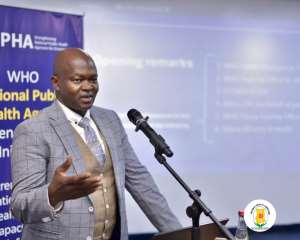
In a significant move to boost healthcare delivery and align with the government’s 24-hour economy agenda, the Ghana Health Service (GHS) has announced plans to extend operational hours at Community-based Health Planning and Services (CHPS) compounds and polyclinics across the country.
The initiative, aimed at ensuring continuous access to essential health services, was unveiled by the Director-General of the GHS, Dr. Samuel Kaba Akoriyea, during a press conference in Accra on Monday, July 14, 2025.
Dr. Akoriyea emphasized that the shift to round-the-clock operations is a critical part of the GHS’s broader strategy to improve healthcare delivery and support national development goals.
“The reason is to align with the 24-Hour Economy Model. The other reason is to take advantage of this opportunity to improve our services. Currently, many CHPS facilities do not run 24-hour operations, and at night, people often struggle to access care,” he said.
He further assured that necessary security measures would be implemented to safeguard staff and patients as facilities transition to 24-hour service models.
The announcement follows recent government efforts to expand healthcare infrastructure nationwide. On June 20, the administration disclosed a bold initiative to construct approximately 600 new CHPS compounds by the end of 2025.
Minister of State in Charge of Government Communications, Felix Kwakye Ofosu, confirmed the scope of the project, stating that every district in Ghana will construct at least two CHPS compounds this year.
“Each district is required to construct two new CHPS compounds this year. That amounts to about 600 CHPS compounds in 2025 alone. If we sustain this momentum, we could exceed 2,000 CHPS compounds over the next four years,” he noted.
Together, these reforms aim to bridge long-standing gaps in healthcare access, particularly in rural and underserved communities, while positioning Ghana’s health sector to meet the demands of a growing 24-hour economy.
The initiative also marks a decisive shift toward strengthening the country’s health system resilience, ensuring that no Ghanaian is left behind, regardless of the time of day or night they require care.


